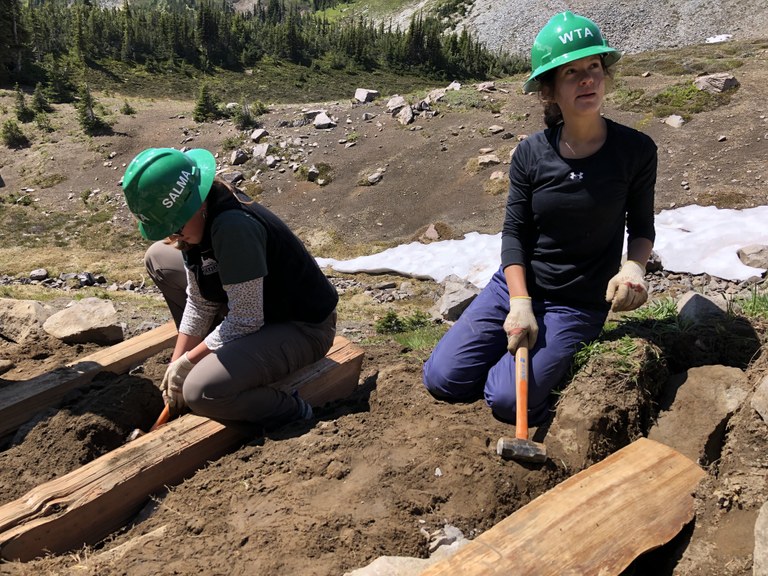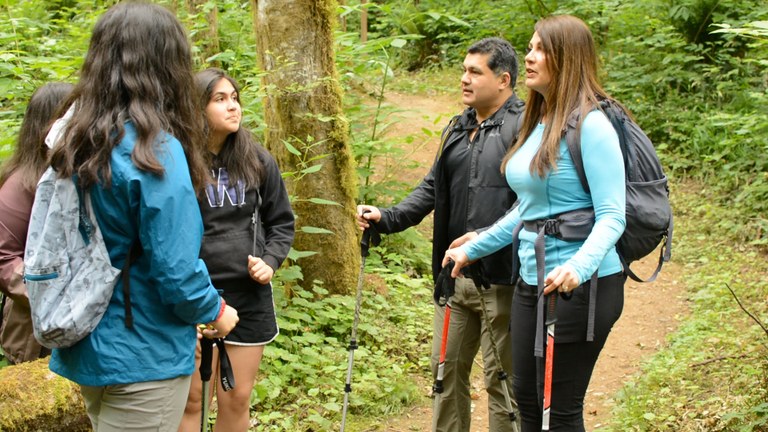 Washington Trails
Association
Washington Trails
Association
Trails for everyone, forever
As 2019 draws to a close, we take a look back at our progress — and ahead to the potential — in our efforts to help build a more equitable hiking community | By Krista Dooley
At Washington Trails Association, we believe exploring nature is good for people’s hearts, minds and bodies, and that hiking is a powerful way for everyone to connect with Washington’s natural wonders. Yet we know social inequities impact all aspects of our lives, including engagement with the outdoors and that significant barriers can prevent many people from hiking.
In 2017, WTA dedicated ourselves to making more progress in our work toward greater diversity, equity and inclusion and developed a plan to guide our work through 2020. During the planning process, we asked for input from all of our community, including donors, volunteers, members and partners. The resulting plan set long-term goals and identified strategies to help us move toward being a more equitable and inclusive organization, as well as creating equitable opportunities for everyone to experience the many benefits of hiking.
Over the past 2 years, WTA has implemented many of the actions in our plan and we’re seeing some progress, both in how we operate as an organization and in how we can help reduce barriers to getting outside.
As one example of this work, our communications team conducted an imagery and voice audit of our print and online content. This assessment helped identify opportunities to share new stories, highlight more voices and expand our images to better highlight the diversity of trail users in Washington.
In addition, we have prioritized strengthening our trail crew leaders’ skills and confidence in inclusive leadership. We’ve also broadened the scope of our safety commitment to include mental and emotional safety alongside physical safety. These actions are important so that every volunteer feels welcome and included in WTA’s community — and has an equal opportunity to give back to Washington’s trails through stewardship.
We are also working diligently to promote policies and programs that help people easily access trails and the outdoors. At the federal level, WTA supports the Transit to Trails Act, which creates a grant program to fund projects that make transportation to green spaces and public lands more accessible for under-engaged communities. At the local level, we rallied support for the King County Parks Levy and its new equity grant program that aims to make parks, recreation, trails and open spaces more accessible.

A Latina trail crew spent several days working on trail near Sunrise at Mount Rainier National Park this summer. Photo by Jessi Loerch.
A key value that we are bringing to all of our work is the power of partnership, and we have focused time and attention on seeking out opportunities to collaborate with people and community organizations who bring new expertise, perspective and experience to our work.
We collaborated with Bam Mendiola on the #expandthenarrative campaign, which centered marginalized and underrepresented outdoor enthusiasts who are changing the dominant perception of who is outdoors. Together with Bam, we invited people to share their stories, which helped expand the narrative about who loves and cares for the outdoors — and reminded readers that not everyone feels welcome on trails. Earlier this year, this collaborative project, in conjunction with the American Hiking Society, received a Together We Are a Force Award from the Outdoor Industry Association.
We also strengthened our partnership with Latino Outdoors over the last few years, including jointly hosting a Latina trail crew at Mount Rainier National Park and collaborating on a Trail Smarts video about family hiking. Additionally, leaders for Latino Outdoors regularly use WTA’s Outdoor Leadership Training resources to support outings for youth and adults in their community.
WTA has also teamed up with the U.S. Forest Service Pacific Northwest Research Station and GirlTrek, the largest public-health nonprofit for African-American women and girls in the United States. Together, we’re working to better understand why walking, trails and outdoor community-oriented experiences are important and what barriers stand in the way for their community.
The Trailhead Direct project is one more powerful partnership. We’ve been working with King County Metro and King County Parks to help make I-90 trails accessible to more people. The transit service also helps accommodate the growing number of hikers, without adding more cars to already crowded parking lots at trailheads.

WTA made a video this year, in English and Spanish, to help families get started hiking together. Photo by Erika Haugen-Goodman.
As we look back at our recent work to improve diversity, equity and inclusion, we are pleased to see the progress we’ve made, but we also know that there is much more work ahead.
As a historically white-led environmental organization, we are aware that our staff and board do not represent the diversity of our community. Over the last two years, we have worked to increase our understanding of equity and unconscious bias, improve internal systems and strengthen hiring processes to increase racial and ethnic diversity and to be a more inclusive organization. But we know we have more to do as an organization to represent all of the communities we work with.
We’ve also begun assessing what barriers stand in the way of people being able to participate in WTA programs, and making adjustments so that our opportunities are more accessible to everyone. For example, this year we re-evaluated at our Youth Ambassador Program and opened the application process to all youth interested in developing their leadership skills, rather than our previous practice of making it an opportunity for our existing youth trail volunteers. We will continue to assess our programs over the coming years and make changes as we find ways they can be more accessible and inclusive.
Additionally, because not every community has access to local green space and trails, we are working to increase our focus on urban projects and community collaboration. One such collaboration is in Tacoma, with the Boys & Girls Club of South Puget Sound. In 2020, WTA plans to open a gear library at the Donald G. Topping Regional Hope Center. Expanding in this region will not only support the existing leaders in the area, but will also provide support to many organizations we don’t currently work with.
As staff and board members, we must remain open to feedback, own our mistakes and stay committed to continuous learning and improvement as we move along our equity journey. One way that we hope to continue our learning is through feedback from our community and our partners. In September, we asked community members and partner organizations to take our second biannual diversity and inclusion assessment survey, and we are reviewing the results. We look forward to learning from this community feedback and using it to guide our priorities for this work. We are grateful for the support of our community and welcome you to join us on this journey to create trails for everyone, forever.